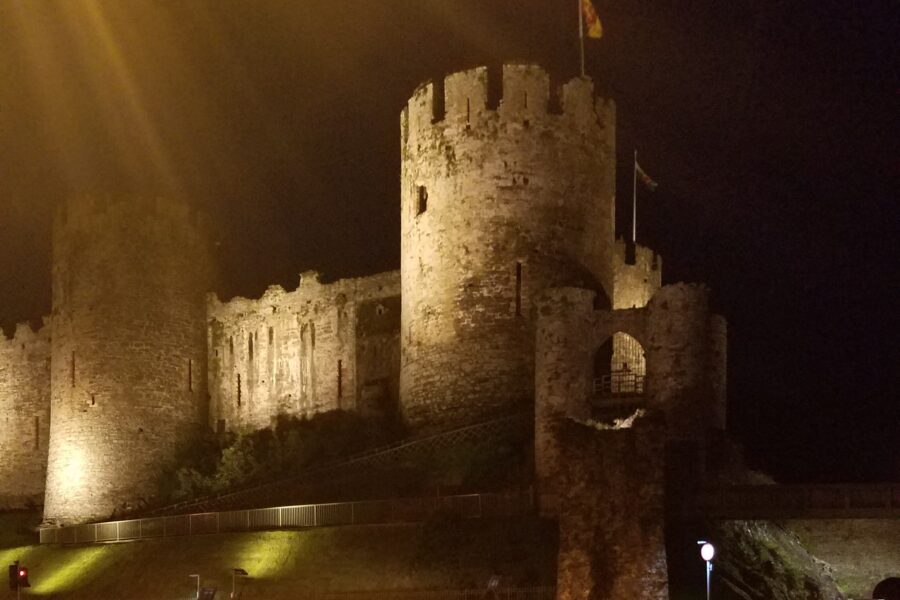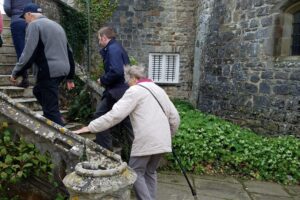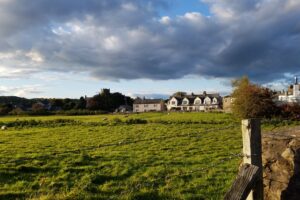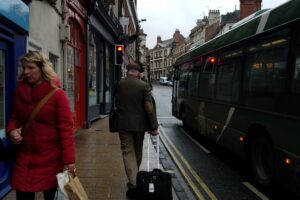Leaving Cumbria
I start packing our suitcases, choosing clothes for our three-night stay in Conwy, and stuffing all the rest of our things for St. Brides in the remaining luggage. I hope I’m doing this right. Michael runs the vacuum. I check all of the drawers and closets.
We end where we began, at the Co-op Grocery Store in Grange-over-Sands, planning to buy a few essentials for St. Bride’s till Michael remembers we are going to be at a hotel for three nights. “Never mind,” he says. I grab some breakfast pastries for us to eat in the car. We pass Higginson’s and I bemoan the fact that his pies are just a memory and I never got to buy more—eat more.
We take the A590 to the M6 and on the divided motorway, I feel like I can safely breathe in the car again. The lanes are wide, the traffic halfway light. When we see signs for Lancaster we take the exit to A683 and begin winding our way to The Inn at Whitewell and lunch. We are on wonderful curving country roads—bucolic beauty. There are sheep and pheasants and rolling hills and age-old farms with crumbling stone and meandering rock walls that climb grassy green knolls. Hills are blanketed with English heather and I want Michael to stop, but there is no place safe, so I try to snap a photo through the windshield and fail miserably.

Lancashire – The Inn at Whitewell
Finally, we round a bend and below us is The Inn at Whitewell, looking just like the pictures on the Internet. I was expecting a town but there is only a church and an attached graveyard, and miles of inn which was once a small manor house, the earliest parts dating back to the 1300s when it was home to the keeper of the King’s Forest of Bowland. Today it seems to be a weekend lunch destination and a venue for weddings. There is a large tent off to the side that looks like a party in the making.

Lunch
A bit too early for lunch we think about exploring the church, but the doors are locked. Deciding that we can at least drink if not eat, we head for the inn, waiting for the magic hour of 12 p.m. I stick to white wine, Michael sticks to beer. Lunch is our meal for the day and we look long and hard at the menu. I choose a Potted Cornish Crab with toasted sourdough, cucumber pickle and avocado purée for a starter. Michael chooses baked goats cheese topped with crushed vine tomatoes, wrapped in filo pastry and served with a bell pepper and olive compote.


I’m beginning to think that this trip is evolving into a never-ending culinary foodie crawl. The first course chosen we move on to the entrée—slow roast belly of pork with braised lentils, parsnip and cider apples puree for Michael and confit shoulder of lamb roast with garlic parsley mash, root vegetables, pea puree and a red wine jus for me. I know what a confit of duck is, but have no idea what I am getting into with the lamb. I trust the chef and the wonderful old venue which is touted as one of the great inns of Britain—and comes very highly recommended by Ian.



The Whitehall swells with diners filling the three-room combination restaurant-pub. Some tables turn over twice and we remain sitting, relishing everything placed before us. The potted crab is light and delicate, the lamb delicious; we take our time savoring the entire meal.

The Gift Shop
When finally we push ourselves away from the table we both head to their onsite shop. I need lotion. It was one thing I didn’t pack. I ran out of suitcase room and I really thought the misty English weather would keep me moisturized. Choosing a 10-ounce bottle of Molton Brown Lime and Patchouli Enriching Hand Lotion and the same size bottle of body lotion, I dig in my purse for a £20 note thinking that will cover it, when the clerk tells me, “That will be £54.” Trying not to flinch, I hand over three £20 notes. I should have asked the price. I’m hoping for twenty-five-year-old skin.
Conwy
Approaching the walled city of Conwy in North Wales, Jeeves takes us the long way around; through the tunnel under the bay instead of over the bridge by the castle. I turn on my phone and ask Google Maps to take us to the Erskine Arms—a hotel with no parking. It takes awhile, going in and out of the town gates more than once, circling looking for a car park so that we can at least check in. We land in the car park used by tourists for visiting Conwy Castle. We unload our luggage and walk toward the Erskine Arms—a stark white edifice tucked into the end of a v-shaped piece or real estate not far from the castle walls.
The Erskine Arms
The reception desk is miniscule—there is no room for wasted space used to impress—apparently the bottom floor is all about the pub and the restaurant and the food. It sounds like a party. I ring the small silver bell hoping beyond hope someone will hear. A friendly, sweet young woman races up the stairs to the desk, welcoming us effusively with a smile and a, “Let me help you carry your luggage.” We start up the adjacent stairs, climbing up to the first floor, down a short hallway, beginning our ascent to the second floor on narrower, winding stairs. I have the easy job, trailing behind, holding only my purse, and still, it is a challenge.


Our room is cream and green and white and cute and clean and pristine. The bed has a beautiful wool blanket spread across its foot, and there are two of the most charming decorative pillows resting against four fluffy white sleeping pillows. Looking out the windows, hung with floor to ceiling draperies made of plaid wool in muted shades of cream, rust, and green, I see the decaying tops of the town walls and the hills beyond. It all seems like a pretty perfect Welsh experience. Now, all we need is a place to park.

Conwy’s Fast Food
At 8 p.m. Michael is making sounds about dinner and talks about picking up some fast food. I Google options.
“Well, it looks like Conwy’s idea of fast food is fish and chips. Luckily, there is a chippy house down the street. We could share an order.”
But now that we are sitting here—Michael wants cod and I want haddock. I order a small plate, he orders a large one. We listen to the conversations around us—well we listen to the words, not understanding a one. Apparently, Welsh is a living language—even among the young, perhaps especially among the young. It’s not just a Welsh accent we may have to try and understand during the next ten days.

The waitress arrives laden down with fish and chips. My eyes widen. The small order could feed a small family—I think the fillet is three-quarters of a foot long. Michael’s oval-shaped fish platter is obscene it is so large. I think the English would call it massive! Unfortunately, it is perfectly fresh. Perfectly cooked. Perfectly crisp.

I need to start cooking again. Soon.









Leave a Reply
Your email is safe with us.